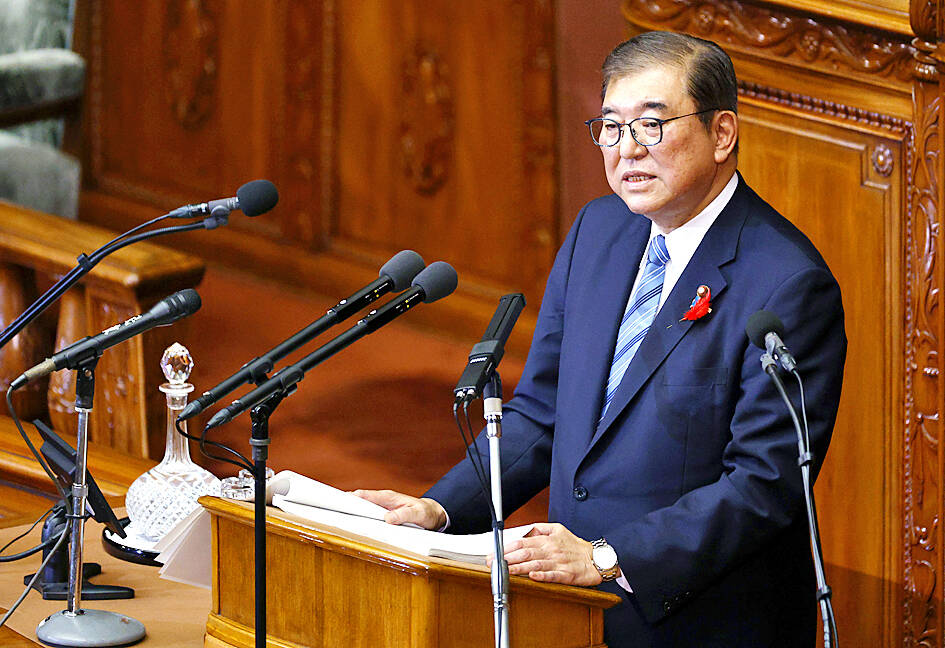Japanese Prime Minister Shigeru Ishiba yesterday warned in his first policy speech that “today’s Ukraine could be tomorrow’s East Asia,” while also dubbing the nation’s low birthrate a “quiet emergency.”
“Many fear that today’s Ukraine could be tomorrow’s East Asia. Why did deterrence not work in Ukraine?” Ishiba told lawmakers.
“Combined with the situation in the Middle East, the international community is becoming increasingly divided and confrontational,” the 67-year-old former Japanese minister of defense said.

Photo: EPA-EFE
Ishiba made no direct reference to China, but his nation’s relations with Beijing have deteriorated as it asserts its military presence around disputed territories in the region. Of particular concern is Taiwan.
Japan has also irked China with plans for a major increase in defense spending and by boosting security ties with the US and its allies, including the Philippines and South Korea.
A Chinese military aircraft in August staged the first confirmed incursion by China into Japanese airspace, followed weeks later by a Japanese warship sailing through the Taiwan Strait for the first time.
Ishiba has backed the creation of a regional military alliance along the lines of NATO, saying on Tuesday that the security environment in Asia is “the most severe since the end of World War II.”
Japan, like many developed nations, is facing a looming demographic crisis as its population ages and the birthrate stays stubbornly low.
The nation has the world’s oldest population after Monaco, according to the World Bank.
Last year, its birthrate — the average number of children a woman is expected to have in her life — stood at 1.2, well below the 2.1 needed to maintain the population.
Ishiba yesterday called the birthrate situation a “quiet emergency,” adding that the government would promote measures to support families such as flexible working hours.
Kishida was unpopular with voters because of a string of scandals and inflation squeezing earnings in the world’s fourth-biggest economy.
Ishiba wants to boost incomes through a new monetary stimulus package, as well as support for local governments and low-income households.
Within this decade, he said he wants to hike the average ¥1,500 (US$10.26) per hour, up nearly 43 percent from ¥1,050.
The yen surged on Friday last week after the Liberal Democratic Party (LDP) voted Ishiba its new leader, because he had broadly backed the Bank of Japan’s exit from its ultra-loose policies, but Ishiba late on Wednesday told reporters he did not think the environment was right for further interest rate hikes, sending the Japanese currency south.
Yesterday afternoon, US$1 bought ¥146.02, having slightly recovered from levels past ¥147 earlier this week.
Ishiba also weighed in on the dearth of eligible male heirs to the imperial throne.
Male-only succession rules mean the imperial family is facing extinction, with only one young heir: Emperor Naruhito’s 18-year-old nephew Prince Hisahito.
“Stable royal succession is extremely important. Stabilizing the number of members of the imperial family is a particularly urgent issue,” Ishiba told lawmakers, calling for a debate on the issue.

MORE VISITORS: The Tourism Administration said that it is seeing positive prospects in its efforts to expand the tourism market in North America and Europe Taiwan has been ranked as the cheapest place in the world to travel to this year, based on a list recommended by NerdWallet. The San Francisco-based personal finance company said that Taiwan topped the list of 16 nations it chose for budget travelers because US tourists do not need visas and travelers can easily have a good meal for less than US$10. A bus ride in Taipei costs just under US$0.50, while subway rides start at US$0.60, the firm said, adding that public transportation in Taiwan is easy to navigate. The firm also called Taiwan a “food lover’s paradise,” citing inexpensive breakfast stalls

US PUBLICATION: The results indicated a change in attitude after a 2023 survey showed 55 percent supported full-scale war to achieve unification, the report said More than half of Chinese were against the use of force to unify with Taiwan under any circumstances, a survey conducted by the Atlanta, Georgia-based Carter Center and Emory University found. The survey results, which were released on Wednesday in a report titled “Sovereignty, Security, & US-China Relations: Chinese Public Opinion,” showed that 55.1 percent of respondents agreed or somewhat agreed that “the Taiwan problem should not be resolved using force under any circumstances,” while 24.5 percent “strongly” or “somewhat” disagreed with the statement. The results indicated a change in attitude after a survey published in “Assessing Public Support for (Non)Peaceful Unification

PLUGGING HOLES: The amendments would bring the legislation in line with systems found in other countries such as Japan and the US, Legislator Chen Kuan-ting said Democratic Progressive Party (DPP) Legislator Chen Kuan-ting (陳冠廷) has proposed amending national security legislation amid a spate of espionage cases. Potential gaps in security vetting procedures for personnel with access to sensitive information prompted him to propose the amendments, which would introduce changes to Article 14 of the Classified National Security Information Protection Act (國家機密保護法), Chen said yesterday. The proposal, which aims to enhance interagency vetting procedures and reduce the risk of classified information leaks, would establish a comprehensive security clearance system in Taiwan, he said. The amendment would require character and loyalty checks for civil servants and intelligence personnel prior to

The China Coast Guard has seized control of a disputed reef near a major Philippine military outpost in the South China Sea, Beijing’s state media said, adding to longstanding territorial tensions with Manila. Beijing claims sovereignty over almost all of the South China Sea and has waved away competing assertions from other countries as well as an international ruling that its position has no legal basis. China and the Philippines have engaged in months of confrontations in the contested waters, and Manila is taking part in sweeping joint military drills with the US which Beijing has slammed as destabilizing. The Chinese coast guard